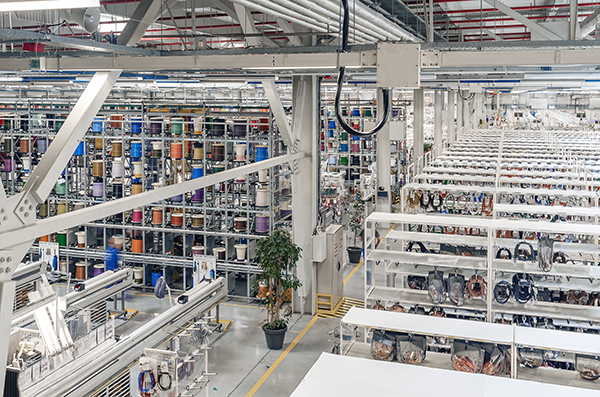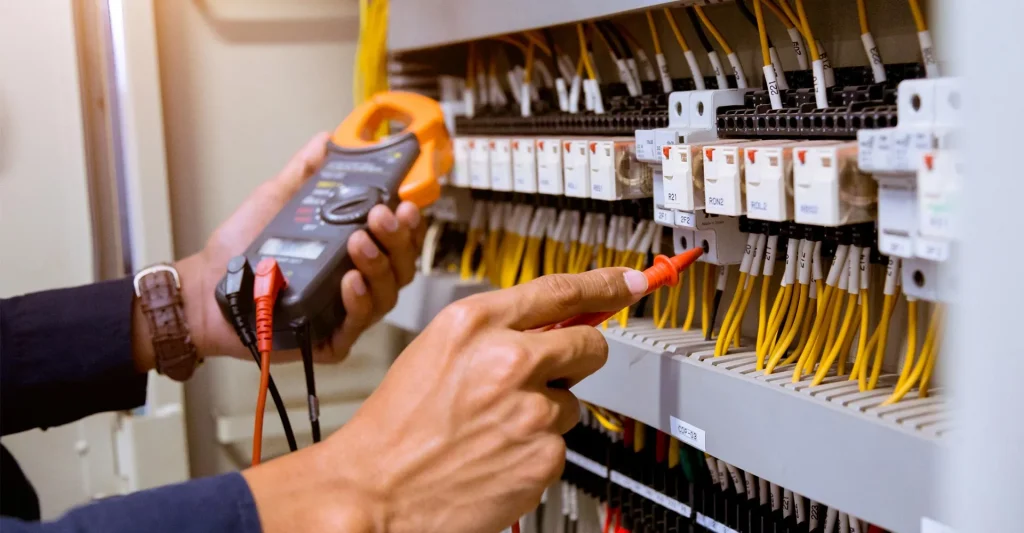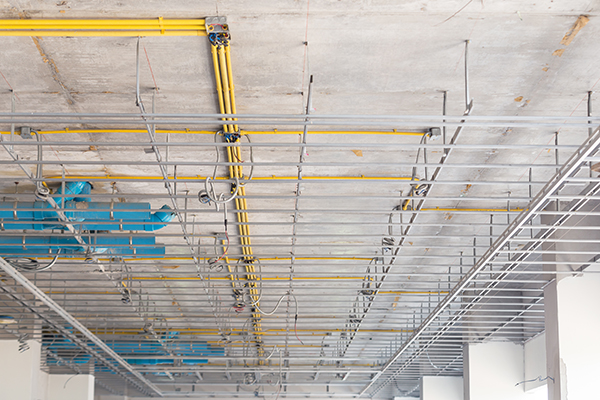Electrical Wiring for Commercial Buildings
Electrical wiring for commercial buildings needs to be of the highest standard because it plays a crucial role in enabling businesses to operate efficiently and safely.
Wiring provides power for circuits to run equipment such as computers and other IT apparatus and ensure optimal lighting and heating. At the same time, it safeguards employees and customers against the risk of electric shock or electrical fire.
Wiring enables a business to function by channelling and controlling the mains electricity supply once it reaches the property’s electrical box. It delivers power via outlets and switches to all the electrical equipment and appliances essential in a commercial building.
Commercial wiring installation and maintenance
 Electricity drives systems vital for businesses, and electrical wires are the veins that deliver the lifeblood indispensable in maintaining operations and processes.
Electricity drives systems vital for businesses, and electrical wires are the veins that deliver the lifeblood indispensable in maintaining operations and processes.
This makes commercial wiring installation a major consideration for businesses striving to thrive in a competitive market.
Wiring or rewiring a commercial property calls for the specialist skills and expertise of licensed commercial electricians.
However, general wear and tear takes its toll on electrical systems over time, so wiring maintenance by professionals is necessary to ensure a business continues to run smoothly.
What are the different types of electrical wiring for commercial buildings?
Different types of commercial properties are wired differently, depending on the type of business and the building itself. For example, a restaurant will not have exactly the same wiring as an office, because their requirements aren’t the same.
That said, the basics of electrical wiring for commercial buildings rely on the general principles of how electricity is distributed in a property.
Electrical cables consist of colour-coded wires. Your wiring may look different than that in another commercial building, depending on when it was put in. This is because a new colour standard (AS/NZS 3000: 2018) was introduced in Australia in 2018 to bring the country into line with the rest of the world.
New and old wiring colours
Colours in the new standards for single-phase wiring are:
- Brown – active (also known as live or hot wire).
- Blue – neutral.
- Green and yellow – earth.
New colours in three-phase wiring:
- Brown – phase one.
- Black – phase two.
- Grey – phase three.
- Blue – neutral.
- Green and yellow – earth.
If your wiring was installed before 2018, the colours will be:
- Red – active.
- Black – neutral.
- Green – earth.
Colours in three-phase wiring before 2018:
- Red – phase one.
- White – phase two.
- Blue – phase three.
- Black – neutral.
- Green – earth.
Even though the colours of your wiring may be outdated, they remain safe in ensuring flow of electricity throughout your business premises.
The problem with the wiring colour changes is that they can confuse a layperson attempting DIY electrical work. This poses the potential risk of electric shock from a live wire, which carries the full load current.
Professional commercial electricians are of course up to speed with the changes in wiring colours.
Does your existing electrical wiring meet the infrastructure needs of your business?
 Commercial electricians in Adelaide are often called on to upgrade business electrical systems that have become outdated or no longer do their job efficiently.
Commercial electricians in Adelaide are often called on to upgrade business electrical systems that have become outdated or no longer do their job efficiently.
If your business is based in an older building, it may need rewiring to bring it up to modern standards. Electrics in older properties can become compromised over time, and defective wiring – wires that are damaged or exposed – is a major cause of electrical fires.
It can be difficult to identify potential problems in electrical wiring for commercial businesses because a lot of it is concealed behind walls or in spaces between floors. This makes it imperative to have your wiring inspected by a licensed commercial electrician.
You may also need new wiring systems if your business updates its infrastructure – the facilities that support everyday business operations – with new electrical equipment that increases power consumption.
Warning signs of wiring problems
Signs that your wiring may need professional attention for whatever reason include:
- Dimming or flickering lights. Lighting circuits tend to have a lower rating than outlet circuits, so they’re usually the first to show signs that your existing wiring is no longer adequate.
- Circuit breakers keep tripping. Circuit breakers shut down the electricity supply as a safety measure if the system overloads. A breaker that trips persistently can indicate a serious issue with your electrics.
- Shocks from outlets and switches. Electric shocks are a critical warning sign of an issue with your building’s wiring. You may also see sparks coming from outlets or switches.
- Discoloration of outlets and switches. An outlet or switch can start to turn brown or black when electrical arcing causes overheating and surface singeing.
Which type of electrical wiring is best for my business?
An efficient, reliable electrical system is critical for businesses. Interruptions of power supply mean lost profit.
While commercial and residential wiring may appear to be similar, there are distinct differences between the two. Electrical wiring for commercial buildings is designed to handle higher load demand and different energy needs.
For example, commercial electrical wiring generally uses three-phase power rather than a single-phase system. And it needs to deliver power wherever needed, including switchboards, power points, lighting and other electrical fixtures and devices.
Data and telephone cabling is equally important to guarantee reliable networks and communications.
Only a professional commercial electrical contractor can tell you which type of wiring and cabling would be best for your particular business.
Data cabling in commercial buildings
As well as electrical wiring, businesses often need to update data cabling. This becomes necessary to maintain optimal connectivity when greater demands are placed on IT and telecommunications infrastructure.
Data cabling in commercial buildings carries data much faster than wireless systems and provides better security while ensuring reliable connectivity between computers, phones and other business devices.
Structured data cabling
Structured data cabling connects data and communications systems with a single bundle of copper or fibre optic cables. This allows access to each network device from one port.
Compared with point-to point-cabling, a structured cabling system (SCS) enables the introduction of new equipment and technology without interrupting business operations.
Why you need a commercial electrician
Electrical wiring for businesses is more complex than that in homes and requires circuits and transformers that can cope with higher voltages.
Installing electrical wires and data cables in a commercial property also typically entails working at greater heights and on larger systems over a longer timeframe.
This is why your business needs a commercial electrician rather than a residential electrician. In South Australia, for example, business owners and managers often look for a commercial electrician in Adelaide.
Types of businesses that need a commercial electrician include:
- Retail – shopping malls, individual shops and larger stores.
- Leisure – cafes, restaurants, pubs, hotels and sport facilities.
- Healthcare – hospitals, medical centres and nursing homes.
- Office blocks.
What do commercial electricians do?
 Commercial electricians create electrical system plans for new constructions and install, maintain and repair:
Commercial electricians create electrical system plans for new constructions and install, maintain and repair:
- Electrical wiring and data cabling in commercial buildings.
- Various other electrical systems, including generators, transformers, motors, internal and external conduits, and switchboards.
Commercial electricians also inspect electrical systems to ensure their functionality, safety, and compliance with industry standards.
And they diagnose and fix problems in electrical systems, troubleshooting issues in:
- Circuits.
- Switches.
- Fuses.
Power outages
Owners or managers of commercial buildings turn to commercial electricians in the event of power outages. These can cost a business dearly in terms of lost revenue during long periods without electricity. Power failures can also damage electrical equipment.
Commercial electricians are adept at locating the source of power failures in commercial properties due to electrical system failures. They’re also experts in fixing the particular issue behind the outage and taking steps to prevent further problems.
What to look for in an Adelaide commercial electrician
The main point to bear in mind when considering electrical wiring for commercial buildings is that it differs significantly from domestic wiring systems and needs to be installed and maintained by a licensed commercial electrical contractor.
This will help improve the overall efficiency of your business by ensuring optimal functionality of electrical equipment and devices. It will also greatly reduce the risk of costly disruptions to the power supply.
When choosing your commercial electrician in Adelaide, key factors to consider include level of expertise, and experience and reputation.
Ask questions such as:
- Do you offer a full design and installation service in electrical wiring for commercial buildings?
- What qualifications do your electricians have to work on commercial properties?
- Can you customise wiring for businesses to match the specific needs of my company?
- Do you install data cabling in commercial buildings?
Getting answers to questions like these should steer you towards a reputable commercial electrician to provide wiring and data cabling services to help your business operate to its full potential.


